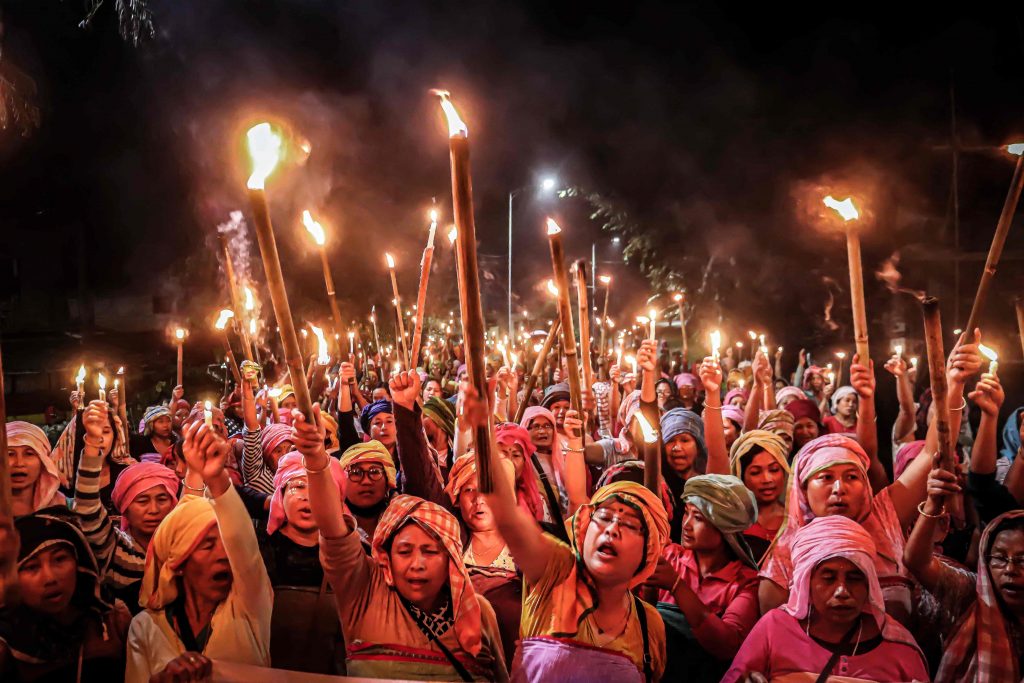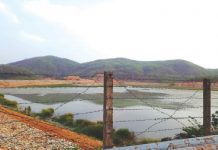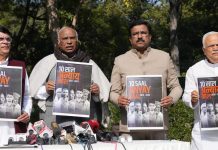
The judgment of Chief Justice MV Muralidaran of the Manipur High Court to grant Scheduled Tribe status to the Meitis ignited a spark in the tinderbox and rekindled old anxieties between the Meiteis and the hill tribes leading to unprecedented ethnic violence, writes Mithun Dey
Let us look back into the history of Manipur to know the causes of violence. The state is still burning for nearly three months. Every day, cases of killings and snatchings are being reported. Reportedly, more than 150 people have been killed and more than 50000 rendered homeless so far. Now, let us discuss the reasons behind Manipur violence. As we know, the state of Manipur is wedged among hills on all sides and the centre point of the state is a valley area. According to Manipur Land Revenue and Land Reforms Act, 1960, Nagas and Kukis are living in the state’s 90 per cent of hill area with 45 per cent population. On the other hand, Meitei Hindus and Buddists are living in just 10% valley area with 55% population.
According to the Land Reforms act, Christian Nagas and Kukis have the right to live in both the hill and valley districts and they have an authority to take the land ownership in both the areas of Manipur. What about the Meitei Hindus or Manipuri Hindus? Only the valley is inhabited by the Meitei Hindus who can neither buy land nor live in hill districts of Manipur. Meiteis feel this is an act of injustice to them. This is the first friction point in the conflict between Meitei Hindus and Christian Kukis.
Almost, 200-300 years ago, there was no Christian missionary in Manipur. Manipuri Hindus often ask, why is the state inhabited by 45 per cent Christians? They came to the state in the later part of the 19th century. While the Hindu religion first emerged in Manipur in the late 15th century. Meiteism is an ethnic religion in the northeastern state of Manipur, Meitei people claim. In ancient times, Nagas and Kukis used to live together in hilly regions of Manipur and they were Adivasis, thus, they worshipped the nature spirits.
Also, Manipur shares a 350-km long border with Myanmar. Consequently, in 1819, Burma (now Myanmar) attacked the kingdom of Manipur. The seven-year long war was a far-reaching conflict between the kingdom of Manipur and Burma. During the war, Prince Gambhir Singh took the help of the British forces and he regained his kingdom of Manipur eventually with the help of the British.
Subsequently, on the conclusion of war, the kingdom of Manipur became a British protectorate. It was quite hard to take British colonialism for Prince Gambhir Singh and did not agree with the British Raj. Later, the Anglo-Manipur war was an armed conflict. The war lasted between 31sth March and 27th April 1891 and ended in a British victory. As a result, the British started mass conversion of Adivasi people in hilly areas. Also, Nagas and Kukis made a colony in the valley area of Manipur.
Meitei Hindus protested that they live in just under 10 per cent of the valley area of the state. Meiteis argued that they were recognised as a ST during the British period and they wanted to get back their ST category. They also argued that if Nagas and Kukis have a right to purchase land in the valley region, why can’t Meitei people buy land in over 90 per cent of the state? The order related to the Meitei community was passed by a single-judge bench of acting Chief Justice MV Muralidaran of the High Court on April 19, 2023. The judgement had revived old anxieties between the majority Meitei community and the hill tribes in the northeastern state, leading to violent clashes and deaths.
On the other hand, Nagas and Kukis argued that Meiteis are very strong politically, they are educated enough, and they have all the power in politics. They ruled over the state from the ancient period. There are 60 assembly seats in Manipur. People from the hilly area claim that only 20 MLAs are from 90 per cent of Manipur and 40 MLAs are from 10 per cent of the state. Also, Kuki students protested that if Meiteis are granted ST status, they would be able to buy land in hill districts of the state. Kukis believe that they have nothing except the land in the hilly region. The other reason for the conflict is that Myanmar Christian people have been living illegally with their Kuki brothers in the hilly area of Manipur for a long time. One of the major causes of violence is Kuki people’s unhappiness over the Manipur government’s massive drive against large-scale illegal poppy cultivation in the hill districts.
The remedies
According to Harekrishna Deka, one of the foremost writers and intellectuals of Assam, to establish permanent peace in Manipur,Biren Singh ministry should be forthwith dismissed or he should be allowed to resign forthwith. Following this, the PM should pay a visit to the state after imposing President’s rule with 2 or 3 senior advisers (one of them should be the Principal Adviser), he said. Deka said that the principal adviser should be a highly experienced IAS officer and the one in charge of Home should be a highly experienced retired IPS officer and none of them should be too old. Full discretion should be given to them to deal with the situation. They should devise a mechanism to involve civil society from the warring communities through a consultative process. They must earn the trust of people by showing absolute neutrality. They should undertake a drive to recover all the stolen weapons from the police armoury. Public order should be restored by professional approach without favour shown to any community but treating them neutrally and restoring their trust and confidence. Intelligence machinery should be revamped and made professionally efficient, Deka said.
Deka also added, “An officer from IB may temporarily be posted there to head the state intelligence machinery. Public should be asked to surrender all illegal weapons by a definite date and following this, a drive against illegal weapons should be launched. The hill communities are losing faith with the central government and due to the PM remaining mum, particularly him equating the happenings of Manipur with those of Rajasthan and Chhattisgarh, has become highly unpopular. He has done a blunder and has proved himself partisan in the eyes of neutral observers. The Manipur situation should not be politically used and diluted in this manner. During the President’s rule, development work throughout the state should be expedited to benefit all communities equally. The Manipur-Myanmar border should be sealed at once”.
In sum, the Manipur-Myanmar border or international border must be closed. All should be assured that all must remain calm and help restore peace. After all, all are part of India. Reservation category will be on the basis of financial condition and not on caste or religion. Right to purchase land should be given to everyone equally. Our Prime Minister should take the help of the CM of Nagaland, Neiphu Rio who is also a part of NDA since the citizens of Nagaland have a good rapport with the Kukis. And of course, the suspension of the state government is a must and the President’s rule must be imposed in the state.













